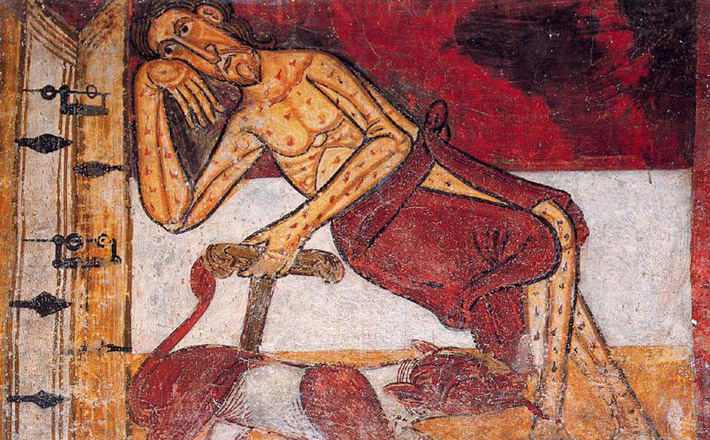Commentary on Jeremiah 32:1-3a, 6-15
This passage stands out as marking Jeremiah’s centrality to the Old Testament.
The strengths of Jeremiah’s character emerge at a most difficult time in the Holy Land’s history. The Babylonians are devastating Jerusalem, and its inhabitants turn in many directions as hope is scarce. Jeremiah boldly invests (literally!) in the Holy Land’s future.
When others are abandoning hope or compromising with evil, Jeremiah can imagine the most hopeful scenes of his earlier prophecies in Jeremiah 29. This reading provides both Christian and Jew with a way to deal with tragedy. Jeremiah never becomes unrealistic or stakes his future on false expectations; rather, he returns to the fundamental sense of the Land as God’s gift to Israel. He never gives up hope in that gift.
The core of this pericope revolves around Jeremiah’s symbolic gesture. Symbolic gestures are characteristic of many prophets and connect Jeremiah to prophets like Elijah and Elisha. Earlier in 1 Kings 11:29-40, we have the report of the prophet Ahijah tearing the cloak of Jeroboam into twelve pieces. We find the only positive report of a symbolic gesture in the Book of Jeremiah; there are a number of negative ones like the shattering of the clay pot in Jeremiah 19.
The timing is important. The first half of the book is full of warning and dramatic actions to try to capture Israel’s attention. In Jeremiah 32, Israel’s fate is sealed. Now Jeremiah’s symbolic gesture points to the hope of the future. Jeremiah receives a divine message to buy a field in Anathoth (verse 7). In a hopeless time, Jeremiah displays complete confidence that the siege will pass and Israel will return to normal affairs in the Holy Land.
Jeremiah’s radicalism leaps off the page at several junctures. Jeremiah has been put under house arrest, not unlike Paul in the New Testament’s Acts of the Apostles. Yet the invading Babylonians have not arrested Paul; his own king, Zedekiah, has arrested him. Jeremiah demonstrates how religious people must be careful not to be co-opted by political leadership. Great pressure was applied to Jeremiah so that he complied with his government’s interests.
As a prophet, and he is explicitly referred to as a prophet in verse 2, Jeremiah realized that he must comply with God’s message. More than anything else, the Hebrew root of prophet (nabi) indicates that a prophet is a spokesperson for God rather than a fortune-teller or anything like that. Jeremiah’s radicalism is also present in his daring journey across a war-torn countryside. Jeremiah exhibits great courage both spiritually and physically.
King Zedekiah clearly tries to intimidate in verse 3. We see the tension between prophecy and governance here. Kings are accustomed to hearing what they want to hear. Often in the past, the king managed to gather sycophantic prophets around him. King Ahab had 400 sycophantic prophets around him and only one who would prophecy independently, Micaiah ben Imlah (1 Kings 22:6-8). Jeremiah and Zedekiah find themselves in similar circumstances, and Zedekiah appears eerily similar to Ahab, the northern king of Israel.
As has been said, things are utterly disastrous in Jerusalem at this time. Jeremiah responds to this desperation with one of his boldest and most hopeful endeavors. He strikes out to his hometown. When others are either being deported or fleeing to Egypt, Jeremiah prepares for the promises of God. He is a counter-sign to those who can only see the limitations of the contemporary political scene in their age or any age. Jeremiah returns to the promises of God that he recently articulated in 29:5: “Build houses and live in them; plant gardens and eat what they produce.”
Although this was advice to the exiles in Babylon, it continues to ring true in the Promised Land. Indeed in Deuteronomy 20:5-8, we find a similar concern for houses and garden (in this case the garden is a vineyard). The important thing is that a garden or vineyard requires a large investment of time and a hope in the future. Jeremiah demonstrates that hope in the future as clearly and bravely as possible. He manifests the true virtue of hope, which allows us to take actions in the bleak present in order to ensure the future of others.
Jeremiah specifically mentions a vineyard in verse 15. Few things speak more hopefully about the future than a vineyard. Vineyards take a number of years before they are able to reward their investment. This is not a short-term investment or a quick fix financially. Jeremiah definitely looks to the future here. And as he looks to the future, he has one eye on the past. He hears what Moses dictates and brings them to fruition.
This connects nicely to the minatory gospel offered this Sunday. We hear of the sufferings of Dives or the Rich Man. He ignored the plight of Lazarus, the poor beggar who was at his gate every morning. At 16:29, the parable tells us: “’They have Moses and the prophets. Let them listen to them.” We see this parable nicely refer back to this deuteronomic tradition shared by the books of Deuteronomy and Jeremiah.


September 29, 2013